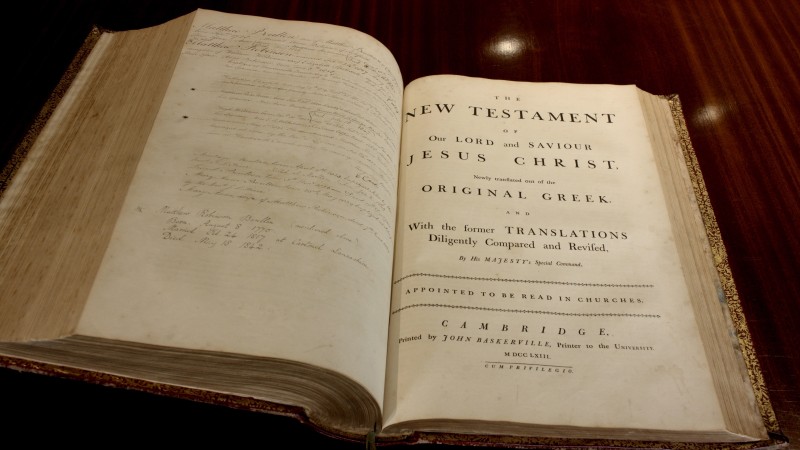In addition to being leading figures in the Midland Industrial Enlightenment the inventor and manufacturer Matthew Boulton (1728–1809) and the entrepreneur printer and typographer John Baskerville (1707–75) were personal friends. A mark of their mutual esteem is the magnificent copy of Baskerville’s celebrated 1763 Cambridge Bible which was in the Boulton family library at their home in Great Tew, Oxfordshire until it came into the possession Birmingham Assay Office in 1986. Due to be auctioned by the Assay Office on 26 March 2020, it was secured for the Cadbury Research Library by funds raised from several institutions, the Friends of National Libraries and a host of individuals, through a Consortium of The Baskerville Society, Centre for Printing History & Culture, the Cadbury Research Library, Birmingham Museums Trust, Birmingham Civic Society and the Lunar Society.
Three distinctive binding features confirm that this superb copy came from Baskerville’s own Easy Hill workshop: pastedowns and endpapers in Baskerville’s own watercolour marbled paper, use of a specific floral roll-tool on the edges of boards, and spine labels lettered in Baskerville type. Sumptuously bound in bright red morocco leather, its boards have floral borders and fan-shaped corner decorations tooled in gilt. Six raised spine bands separate compartments with elaborate gilt designs and one panel for the black morocco label. Its Boulton provenance comprises contemporary ink manuscript family history including births and deaths found on the Apocrypha verso blank leaf facing the New Testament title page. Another loosely inserted note incorporates an early nineteenth-century list of the Boulton children’s illnesses and vaccinations.
The future permanent home of the Boulton Baskerville Bible will be the Cadbury Research Library at the University of Birmingham, where it will be added to the existing Baskerville Collection. The original bequest of this collection, presented in 1954 in memory of Victor Hely-Hutchinson (Professor of Music at the University of Birmingham 1934-44) by his brother, comprised 86 items, representing almost all the books for which Baskerville was responsible; most are in fine condition and many have distinctive individual features of note.
The Boulton Bible will join four Hely-Hutchinson copies of the 1763 Cambridge edition, all in splendid bindings the best being in red morocco leather by Derome Lejeune, the greatest contemporary French binder. A fifth copy was donated by Benjamin Tillett Davis, forensic pathologist at the University of Birmingham, medical historian and lifelong discriminating book collector. The provenance of this copy is also iconic, as it has the bookplate of Sarah Baskerville as well as being associated, after her death in 1788, with the Ryland family who recorded their family history in this copy exactly as the Boultons did in theirs (in 1873 Louisa Anne Ryland donated the land of Cannon Hill Park to the people of Birmingham). Sarah’s copy uses Baskerville’s marbled paper and has a Baskerville lettered spine label; however, in contrast to the Boulton copy, the binding is a plain undecorated blind stamp design. The new total at the Cadbury Research Library of six copies of Baskerville’s print masterpiece is now the largest in UK institutions; the only other library in the world with six copies listed is the famous Houghton Library at the University of Harvard.
The Cadbury Research Library is proud and delighted to welcome this wonderful addition to its holdings and we eagerly anticipate a time when we can fully share in celebrating its retention in Birmingham with all our fellow Baskerville scholars and enthusiasts.
